#a education system and social system built for the rich
Explore tagged Tumblr posts
Text
Anyway, if you're wondering why I'm not posting any art: I am literally struggling to survive. This is the most stressful time I've ever had in my life and I have worked several jobs while managing a household and caring for a family member before. This might truly break me and I am NOT easy to break.
I barely sleep, I have no time for physical exercise, I have more to do than I can possibly ever check off my to-do-list and adding to that, people are being truely awful and testing my patience, which is literally running so thin you can see through it like it is a window you just cleaned.
I'm having heart issues and permanent headaches, that's how bad it is. I slept a total of 1 hour this night. I'm permanently nauseated. Oh and to top all that off I'm poor and my only weather-appropriate pair of shoes has been falling apart for about 3 months now and I still haven't been able to buy a new pair.
#this is because of hustle culture#a education system and social system built for the rich#and the ignorance of people from less fortunate backgrounds#i remember I regularly ate food that was technically expired as a child#I walked around in clothes that were too small and patched and froze my ass off in the winter when other parents could get their children#when the public transport didn't happen and we had to wait an hour in the freezing cold#but my parents only had one car and my dad needed that to get to work because he left the house before I was even up and came back after#dinner time#People don't understand that I've experienced enough stress to fill a lifetime#These people are so privileged that they're not even aware what real stress is#I had someone who doesn't work while studying#and lives with their parents#complain that uni is too stressful atm#I mean yes#it is for you too#but my god you don't have any idea what its like for everyone else#okay#rant over#anyway#fuck capitalism#and whatever postcapitalist dystopia we currently live in#Eat the rich
2 notes
·
View notes
Text
🌛Astro Observations - 3🔭
Note: This post fits both the Western and Vedic systems. Take what resonates and leave the rest. One placement or aspect cannot say much and the whole chart has to be analyzed to know further. Lemme know in the comments if any of these hit home!
Men with Venus in Gemini contradict themselves when it comes to attraction in women. They say women with x and y qualities doing z things attract them and marry someone with a and b qualities who do c things. I've noticed that in charts that these men tend to marry a woman completely different from those they have dated before. Their wife would be very different from the women they have had relationships with.
Women with Jupiter in the 5th house want a partner who would be a good husband and a father to their children, similar to a man having Moon in the 5th house. They do have dating opportunities, but they don't rush into relationships. They enter a relationship with the idea of marrying their partner someday. Jupiter makes them wise in the dating and romance matters and for men having Moon in the 5th makes them choose a woman who would be the mother of their children.
People having Jupiter in the 7th house, Venus conjunct Mars, Mercury in Gemini 7th house or Mercury in Aquarius 7th house of their birth chart tend to be attracted to both men and women. Not all of them but many are.
Venus in the 5th house people can try modeling, acting, singing, etc. Most likely to have daughters rather than sons. Also, their children would look beautiful/handsome, and children are often complimented for their good looks.
Men with Lilith in the 12th are often attracted to women who give them the "taboo/ forbidden" kind of attraction. They often hide/bury deep down what they're attracted to, fearing society would call them a misogynist or a bad person. They are drawn to women who already have a partner or women who don't date/are inexperienced or are married women. Their attraction to women, in simple terms, would be considered unacceptable in society.
Women with Lilith in the 10th, seriously, I feel bad for them. Any 10th house Lilith here? Show yourself! This placement makes them prone to gain a negative reputation in the public or for their work. Even if they worked really hard and climbed the social ladder and built everything brick by brick, people would see these poor souls commenting that they slept their way, used their appearance to stand where they are. Comments like "she's hot but dumb", "she should have slept with him to stand where she is now". Also, these women are prone to attract not-so-well-intentioned men in their lives at times. People would think they sleep with every man they go out or seen with, even if they're just posing for a friendly photo with a random man they don't even know well.
Women with Lilith in the 11th, ladies, your social circle is enough to betray you, badmouth you behind your back, and backstab you at the worst possible time, which hurts worse than a breakup. You might have had at least one bestie that you're close with who betrayed you or badmouthed you behind your back. Am I right? Also, you are terrible at picking friends. You're successful at choosing the wrong person to be your friend 8/10 times. You might even lose hope in friendships at some point or stay away from friendships overall. Also, take care of your private photos and DO NOT trust your friends with them or if you're in your 20s already, you should have learned by this point.
Mars in Libra people wanted peace and harmony in relationships rather than being rich but somehow manage to fall for people who bring nothing but drama. Sometimes, you like to argue because you're bored and want some entertainment.
Mars in 5th house people might face trouble completing their education or dropping out at some point. Home-schooling or part-time education is a possibility. Also, this is a placement for an unplanned pregnancy as well. If not taking abortion pills or such, they might even end up with a kid as a teen or as an undergrad.
Mars in the 3rd house people have strong hands. Their hands are the strongest parts of their body. Prominent drummers, musicians, boxers, wrestlers have this placement and also adding electronics engineer, gym coach, plumber, mechanical engineer, MMA fighter, etc to this list.
3rd lord in the 11th house people are good at drawing or at least love to draw a lot. They like DIYs and crafts. As a kid, these natives pick on pencils and other stationery items with their favorite cartoon or comic character in it and even when they get past 30, they would still be watching comics, cartoons or playing games. This is also a good placement for someone to pursue a career in game development, comic writing, animation, costume designing, how-to and tutorials, etc.
North node in the 6th house people can get fired out of nowhere and gain money when they least expect it. This placement makes their daily routine unconventional in some form and in some cases, this can manifest as a physical or mental disability. They can be allergic to certain medications as well.
✨🔍Wanna dive deeper into your chart's layers? 🌙💬 Check out my pinned post for pricing and more info 💫💸
#birth chart#astro notes#spiritual awakening#spirituality#spiritual journey#vedic astrology#zodiac signs#astrology readings#astrology#astro observations#western astrology#astro community#astro tumblr#astro posts#astro blog#astrologer#astrology notes#astrology community#astrology observations#astrology blog#astrology signs#natal chart#natal astrology#natal placements#natal aspects
651 notes
·
View notes
Text
i really love how much jack and belle complement each other with how polar their strengths and weaknesses are. it goes so deep into the relationship but ill discuss two examples: for one, the learning styles. so belle's very theoretical/educated approach as to jack's experience-based and hands-on learning. jack is very much hands on, kinesthetic, and experiential in his learning. thats because of his circumstances, not just the fact that hes dyslexic and really struggles to learn text-wise, though thats a factor. life in london with fagin-- from the beginning he had to learn on his feet. thievery is very much a hands on learning thing. then he goes on TRANSFERRING those skills of quick thinking, adaptability and quick fingers when he is thrust all of a sudden into surgery and war in the navy. thats really proof of how intelligent he is, that speed of learning and transferring skills, though its not a 'traditional' kind of smart. his physical dexterity is very much echoed in his mental dexterity, an aspect i love in how his character was built.
BELLE, on the other hand, total opposite. she literally cant get experience; shes a woman, shes a governor's daughter expected to live and act like a proper woman. though her headstrong nature and the way she swings around her privilege like a flaming torch lets her get experience later, she spent most of her pre-show life learning from books because that was the only resource she had. she's educated, she's rich, and she's really really smart and really really determined, so she CAN and WILL learn.
another thing is their worldview. belle's very much visionary and idealistic, jack is a realist. theyre both limited by society (not EQUALLY, and not in the same way, but they are both limited by society), but they respond in opposite, and equally flawed but valid ways, and its literally only with each other that they are able to balance out that response to the world and be the best they can be. they learn from eachother: belle gets a crash course in the reality of abusive governance and empathy for the realities of the lower class, jack is able to open his eyes to how much he can initiate change on the global scale with his skill.
belle's upbringing makes it so she has the social power and desire to fight and advocate for herself, something evident from the moment she threatened jack in episode 1 (essentially 'teach me or go to jail, fucker'). now the morals of that im not going to get into, but its a kind of power jack never had. because poverty. hence his complacency to hospital standards he doesnt agree with, because while belle can afford to fuck around and find out, he could lose his job with a single misstep.
BUT BUT BUT, with her at his side; his experience plus her social status and her idealistic vision for the world, theyre able to do SO MUCH GOOD! for the world, for eachother. she pushes him and he balances her out and opens her eyes to reality. he doesnt shatter her idealism but shes exposed for the first time to the dark side of the system her father runs: why people steal, why its not as morally black and white as theyd like her to think. but they literally couldnt do any of this: the revolutionary surgeries, the personal development, without eachother.
they change each other, irreversibly, for the better. thats a powerful relationship.
105 notes
·
View notes
Text
This was a conversation born on Instagram and I thought Tumblr would be an appropriate place to drop it.
_________________________________________
Colonization and the Demonization of Indigenous Beliefs
When the British colonized Nigeria, they didn’t come alone—they brought missionaries. These Christian missionaries didn’t merely preach the gospel. They actively worked to dismantle African spiritual systems, labeling them as "heathen," "pagan," or even "demonic."
To become a Christian wasn’t just a spiritual decision—it was a passport to social acceptance, education, and opportunity under colonial rule. But the cost was high: rejection of one’s own culture and spiritual heritage.
> "Colonialism did not only take our land. It took our gods too."
—Chinweizu, Nigerian philosopher
Over time, Christianity became associated with advancement, literacy, and development. Churches built schools, hospitals, and orphanages—contributions that were tangible and appealing.
Meanwhile, African spirituality was painted with a brush of fear and superstition. Practices like divination, ancestor veneration, or herbal healing were branded as “juju” or “witchcraft,” effectively alienating new generations from understanding their sacred origins.
Internalized Colonialism and Religious Fear
Even after independence, the colonial worldview persisted. Many Nigerians inherited a mindset that Western ways are superior—and this included religion.
Generational Disconnect and Cultural Amnesia
Centuries of demonization led to a deep cultural amnesia. Many Nigerians today have never learned the real meanings behind their people’s spiritual practices. What remains are distorted images—rituals taken out of context, exaggerated stories of curses and spirits, and a widespread fear of being labeled a witch or idol worshiper.
The truth? African spirituality is rich, ethical, and deeply philosophical—rooted in harmony with nature, communal balance, and reverence for the ancestors.
Reclaiming What Was Lost
In recent years, a quiet but powerful revival has begun—especially among young Nigerians and members of the diaspora. Many are reconnecting with systems like:
Ifá and Orisha worship (Yoruba),
Odinani (Igbo),
Bori (Hausa), and more.
This isn’t about rejecting Christianity, but about healing the break that colonization caused between African people and their spiritual identities.
> "To know where you're going, you must understand where you came from—including the gods your ancestors served in love and not in fear."
And to that, I want to add this....
I’m an Atheist. I don’t believe in gods or devils in the literal sense. But I do believe in stories—and the power they hold over people, cultures, and history. So when I hear about how African spiritual systems were labeled “demonic,” I hear—knowing what it truly is—erasure. I hear a calculated strategy to destroy a people’s connection to themselves, their ancestors, their land, and their sense of the sacred.
The only real “devil” in this story is the colonial machine—the empire that cloaked itself in holiness while stealing land, rewriting truth, and trading souls for social status.
Even though I don’t follow any religion, I can see the sacredness in what was taken. And I believe deeply in the work of helping us reconnect with the wisdom, beauty, and balance of our ancestral spiritualities.
Whether or not I believe in gods does not matter, What I truly believe in is us.
#trending#new#explorepage#mr1hand#real life#white supremisist#religion#africa#european colonization#colonialism#colonial history#nigeria#christianity#christian faith#christian living#spiritual rot#spirtiuality#african spirituality
7 notes
·
View notes
Text

July has been a month of ups and downs in that there have been some truly excellent shows for me to watch but there have also been plenty of let downs. It's also been a month where I've had more free time than usual thanks to my being on holiday and I've definitely taken advantage of that to cram in as many dramas as I mentally and physically can.
Anyway here's a song for the month (perhaps I listened to it so much to trick my brain into believing it's summer despite the constant rain) and let's get started!

4Minutes 🇹🇭👨❤️👨 [1/8]
What a strong start. I am seated and fully on board with wherever this drama wants to take me next. Something I really loved was how the first episode opened up so many questions with regards to various characters and their motivations and didn't just bank on the central plot device to build the intrigue (although there's plenty of intrigue there as well, and quite possibly already some answers). Yes I want to know about the seeing the future thing, obviously, but I also want to know about Great's relationship with his family, what kind of person Korn actually is, and why Tyme seems 5 kinds of jaded despite still being early in his career.
Battle of the Writers 🇹🇭👨❤️👨 [1/12]
This one.... I'm not sure about. Its selling point was (and still is) that it's fulfilling my wish to see Tutor and Yim as leads and, in that, it's doing very well indeed. But, I'm not going to lie, the only reason it's here instead of in the "dropped" pile is because I try to give every show 2 episodes before making a decision. It's not that there's anything wrong with it (it genuinely seems like a perfectly good show judging by the first episode) but I just don't think it's something that's going to be able to hold my interest and make me want to make the time I need to watch it.
Century of Love 🇹🇭👨❤️👨 [3/10]
I took a break from this one but I'm fully planning to catch up! I was enjoying it but I wasn't in the right head space for it at the time. I am now though so I'm going to rewatch the first 3 episodes and then hopefully be caught up in time for the last episode.
Knock Knock Boys 🇹🇭👨❤️👨 [10/12]
I am very attached to all the residents of the Knock Knock house but especially Latte, I 100% buy that he has no problems finding partners because he won my heart too. I also really like his and Almond's storyline, not just the romance (although that is very cute) but the things that built that romance up; the intimacy group, their friendship with Shawn and Jumper, their friendship, the careful handling of the hidden camera story arc... Some really good writing all around there. I'm a little less sold on Thamwa and Peak (despite them being the older characters their storyline feels less mature if that makes sense?) but I'm still enjoying them immensely.
Midnight Romance in Hagwon 🇰🇷👩❤️👨 [1/16]
I needed to take some time before I started watching this because I knew it was going to be such a rich watch. One episode in and it was already like eating a 3 course meal, there was so much to unpack and I am loving it. I know from @lurkingshan that this drama focuses much more on the education/Hagwon system than the titular romance and I also know that's not for everyone but, as someone who has a professional interest in the education system, that's more than okay with me and I'm curious to see what conclusions it comes to.
My Sweet Mobster 🇰🇷👩❤️👨 [14/16]
I'm really loving the main message of the show (restoration not perpetual punishment) and the vibrancy of the characters. The ex-cons are so much fun and the found family they make together is adorable and hilarious in equal measure. The central romance is pretty adorable too with the gruff-softie/feisty-with+heart combo, although it is probably the thing I'm least invested in as it's quite typical for a k-drama romance (I actually think I prefer the second couple thanks to their social taboo breaking). Overall it's been a fun ride and I'm going to miss it when it's done, I'd also definitely recommend it to anyone who enjoyed A Business Proposal (it gives off very similar vibes).
Sweet Home S3 🇰🇷 (👩❤️👨) [2/8]
I don't think any of the proceeding seasons could ever have hoped to live up to the masterpiece that was season 1, but, to be fair, I never expected them to. What made S1 outstanding was it's confined and cramped setting and how that was then used to explore the complexity of social relationships through the lens of monsters vs survivors. Once they left the apartment complex and opened up the world, they were never going to be able to maintain that in quite the same wau. Still, I'm enjoying S3 for what it is and I think it's going to be a good conclusion to the series.
The Trainee 🇹🇭👨❤️👨 [5/10]
This. Show. Is. Fantastic. It's the first time in a long time I've seen a drama treat the workplace seriously and not just as set dressing and so far it has hit all the right beats. Characters, comedy, themes, relationships, plots and subplots? All on point so far and developing so nicely in a well paced slow burn that it's obvious to me how much thought and care went into making this show. Also Gun is in equal measures cute, funny and relatable as Ryan and Jane is definitely Off's best and most crush-worthy character to date (which is great because that leaves Ink for me).

Lovestruck in the City 🇰🇷👩❤️👨
Lovestruck in the City was an incredibly ambitious drama, both in terms of its format (a semi-docu interview style mixed with a lot of flashbacks) and its central theme (an exploration of modern relationships, especially those coming to or after their end). I really wasn't expecting it and to say I was pleasantly surprised would be an understatement. However what started off as its strengths in the first half ended up becoming its weaknesses in the second; it wanted be and say too many things all at once and in the end what was innovative about it got lost in its attempts to still fit the typical romance k-drama mold.
⭐ rating: 7/10
Moonlit Winter 🇰🇷👩❤️👩📽️
I don't know how to describe this film other than quiet but with a lot to say. It doesn't shrink away from the harsh realities of growing up, falling in love and living in a society where part of who you are is treated like something dirty and the lasting trauma that inflicts, but it also offers solace and comfort and a quiet hope for healing and change. It broke my heart and healed it in so many ways and I'm going to be thinking about it for a long time to come and recommending it to whoever will listen.
⭐ rating: 8.5/10

I should start by saying that I drop dramas quite often and for a variety of reasons. I don't have to be not enjoying a show to drop it, I just have to not be enjoying it enough. This means that there are plenty of dramas in my dropped pile that I think are perfectly decent shows but which, at the same time, didn't pull me in enough within the first few episodes.
Love Sea 🇹🇭👨❤️👨👩❤️👩 [On Hold]
I thought Rak and Mut's storyline was great and I genuinely enjoyed their dynamic, even more so with all the meta around it. The very fact that this is "on hold" rather than straight up "dropped" is a testament to how much I am still taken with them. Unfortunately, however, Vi and Mook made me want to put my head through a wall every time they were on screen together and I couldn't, for my own sanity, keep watching a show where I was skipping half of each episode in a desperate attempt to escape even a glimpse of their scenes.
Red Swan 🇰🇷👩❤️👨 [Dropped]
I think I got to episode 3 or 4? It was very fast paced and there was plenty of intrigue and family plotting to keep me on my toes, which I did appreciate. It also did a great job of making me feel like something was actually at stake and that the protagonists weren't always going to win, which is pretty rare. Ultimately though, I have a lot of other dramas that I like a lot more and which are more to my taste in terms of genre and subject matter, so Red Swan gets the boot. I would consider picking it up again later though.
Serendipity's Embrace 🇰🇷👩❤️👨 [Dropped]
I found the first episode of this surprisingly boring, so much so that I spent a lot of it flicking through the news on my phone and didn't even consider watching the second. I'm glad that Chae Jeong Hyeop seems to be making a name for himself though. I really liked him in Love All Play and Castaway Diva (both of which I stuck with for longer than I normally would have for him btw), I guess now my hope is he gets some dramas that aren't quite so.... Middling.
Sunset X Vibes 🇹🇭👨❤️👨 [Dropped]
This is so very much not my style and I knew that going in but I was briefly led astray by how beautiful Bank and his outfits were.
Wandee Goodday 🇹🇭👨❤️👨 [Dropped]
I'm not going to go into loads of details because I've spoken enough about my feelings towards this drama. All I'm going to say is that it's the one that hurts the most to put here because I had such high hopes going into it. On the plus side, it's given me an OST to add to my playlist and 2 pairings I would quite like to see again.

Things have been relatively quiet on the K-dramas side of things these past few months but it finally looks like there's a number I'm looking forward to for August! Looks like I'm still going to have to wait for a K-BL to watch, however, I think the last one I watched was Love for Love's Sake and that was a depressingly long time ago now.
Monster Next Door 🇹🇭👨❤️👨 [Aug 8] ⭐
Romance in the House 🇰🇷👩❤️👨 [Aug 10]
Love Next Door 🇰🇷👩❤️👨 [Aug 17 ] ⭐ (being introduced to Jung Hae In through Something in the Rain means I am now automatically excited whenever he's in a drama).
The Paradise of Thorns 🇹🇭👨❤️👨 [Aug 22] ⭐
Cinderella at 2am 🇰🇷👩❤️👨 [Aug 24] ⭐ (Shin Hyun Been is also an automatic watch)
No Gain, No Love 🇰🇷👩❤️👨 [Aug 26]
I'm always open to recommendations so if there's an upcoming drama you think I might like, please let me know! Doubly appreciated if they're JBLs because I really want to break the stupid block I have with them.
#monthly wrap up#july#thai bl#kdrama#4 minutes#century of love#battle of the writers#knock knock boys#midnight romance in hagwon#sweet home season 3#the trainee#lovestruck in the city#moonlit winter#love sea the series#serendipity's embrace#wandee goodday#sunset x vibes#my sweet mobster#red swan
27 notes
·
View notes
Text
Raina Memories: Of Two Worlds
(CONTENT ADVISORY: Racism, authority figure abuse)
I think I was 7, or maybe 8.
The forest had changed a lot. The town had developed a great ammount in the years since, and because of it, a number of the trees were cleared out. Because of that, there was a huge hole in the canopy that my mother and I could more clearly see the stars from. At the time I was overjoyed at this. I was too young to understand what was fully happening to the world around me.
I would learn later that the town size had been bolstered because of the discovery of mana-ore in the middle of the forest, a vital material in magic device creation. As soon as it was found, much money flooded into our little village, and with it came a swarm of opportunistic businessmen. Foxman would grill into Anne's head later on about the importance of keeping people like that on a short leash, but our town would learn that the hard way.
At this point, I had started school. School was very lax in the monster kingdom. If you missed the morning classes, the classes would be available again in the afternoon. It has a leveling up system, starting at Tier 1 and going up to Tier 10. Once you finish all the Tier 1 classes, you can start attending the Tier 2 classes. You can clear them at any pace you want, and there's no social pressure to rush it. It's a system Sanctuary would eventually adopt.
As the years went on, the powerful rich and wealthy merchants wanted to reform school to better train students to be valuable pawns. I would be long gone before they would follow through with their plans. I continue to be grateful to be out of there.
It was Physical Education, my worst subject. Not because I was unfit, (though, I was,) but because I was bipedal. Competing against creatures with four legs was very discouraging, no matter how much the teacher pretended I was doing good. Even the ones with two legs, many of them still had legs that were built to outperform me in every way. I so badly wanted to RNG edit my weaknesses away, but my mom believed that'll get us both caught.
Of course, before I could attend, I had to get scanned for enchantments. I stood in front of a white wall facing the nearby lake where our classes would happen. A tentacle monster working for the school waved a glowing stick over my body as I cooperatively stood in an A-pose.
BEEEP! Goes off the machine. I had worried for a second that it was on my side, but I looked over to find that Vixy the kitsune just got busted for enhancing her legs again. Her family was fairly rich, so she probably bought someone to give her a bit of a boost.
She was escorted to the principal's office. Meanwhile, I got to my class unscathed.
Our PE teacher was a fairly strict Loch Ness monster that ran the entire class from the water.
"Alright, get those stretches in! Work those calves! Now do some jumping jacks!" She couldn't even do the exercises herself, outside moving her flippers in a pale imitation of the motions.
The activity for today was bubble ball. Basically, you try to keep the ball in the air, if it lands on your team's side of the field, your opponents get a point. Basically volleyball but with full teams and no net. The class was divided between students with hands, and those without, which was a partial relief to me as some of the best bubble ball players were on that side. The no-hand side had so many students that they had to divide up into many teams before they could play.
The ones with hands barely had enough for two teams. On my side was a kappa, and a faun. On the other team was a slender, a human, and a pair of floating disembodied hands.
The game started and I wasn't much help. Everyone else ran so much faster than me and it was all happening too quickly for me to follow. At one point, the human on the other team was about to bounce the ball when the faun shoved him to the ground, causing the ball to land on the opposing team's side. The coach didn't see that and a point was awarded to us.
The human, a pale skinned boy named Travis, wouldn't take that lying down. "No fair! He pushed me!"
The red haired faun named Tris responded, "No I didn't! You're lying just because you missed it!"
"Yes you did! You shoved me!"
None of the other students were getting involved, but I couldn't sit still. "I saw the whole thing, he really did push him."
The faun glared at me, but his scowl quickly turned into a grin. "Got your girlfriend to back you up?"
Because they thought I was human, and because Travis was the only human in the class, they always assumed we were dating. It was annoying, but even more annoying for Travis because...
"For the last time, she's NOT my girlfriend!" Shouted Travis, looking as if a vein was going to pop out of his head. "I wouldn't date a ni████!"
...yeah, he said that...
Almost to punctuate that word, he shoved the faun on the second syllable. The faun pushed back and they quickly started throwing fists.
"Hey! Break it up over there!" Yelled, the coach.
Feeling like I had to do something, I walked over to try to grab their shoulders and pull them apart. However, as soon as my hand touched Travis' shoulder, he threw a fist at me and punched my lights out.
Travis and I were hauled to the principal's office. A stern faced Minotaur scolded us for starting fights. We were placed on a bench, so we basically had to sit right next to each other. He would go on and on about responsibility, and how this dishonored the school. He even referred to me as Travis' girlfriend at one point. I tried to argue my case, but he read this as talking back and smacked my shoulder with a ruler. Travis simply said nothing. He probably knew better than to argue back when the school decided what the truth was.
We were both given detention for a week and our parents were called. When Travis' parents arrived, they saw me with him and gave him a big scolding for even coming near me. Soon after, my mom arrived to pick me up.
As we walked home, I told her the full story. Upon hearing it all, she could only sigh. "Raina, what were you thinking about getting involved with those two boys?"
"I wanted to help out." I meekly said.
"You knew it would have ended badly no matter what!"
"I know just... the royal family is supposed to bring people together. I was trying..."
"They don't know your royal family, and even if they did, there was no guarantee they would have even listened to you!" She let out an even deeper sigh than before. "Maybe it was too soon to tell you about our family. Maybe informing you was a mistake..."
"Mom..."'
"We're supposed to be laying low, Raina! What were you thinking?"
We were silent the rest of the walk home.
We approached the bakery. Mom unlocked the door and clutched the doorknob, but stopped herself from going inside. She sighed and turned to me. "Raina, I'm sorry. I know you were just trying to do the right-"
But before she could finish that thought, the man in the suit and tie from the last memory came out from the darkness.
It was clear from the shock in my mom's face that she wasn't expecting him. "Oh! What are you doing here all of a sudden?"
"Why does Raina have a black eye?" Asked the man.
"She got in a fight in school, that's all." She gestured towards the house and looked at me. "Why don't you go inside and wash it out, Rains?"
I entered the house and washed it as I was told, but as soon as I did, I quickly went back to the door to listen to their conversation from the other side.
"You can't protect her, you should leave her in our care."
"You know I can't do that!"
"She is the future of monsterkind, if anything happened to her..."
"I'm not going to let you groom my daughter into becoming a god! She deserves a normal childhood!"
"She is not normal. She needs us."
"You're not having her and that's final!"
The man frowned and stepped back towards the shadows. He turned back one last time. "If it becomes clear that she's no longer safe in your care, I will personally take her from you. That's a promise." He stepped into the shadows and he was gone as quickly as he arrived.
Mom flew the door open and quickly noticed I was listening. Upon seeing me, she looked away. "Raina, there's some leftover bread in the shop. Please help yourself to dinner tonight." She climbed upstairs and slammed the bedroom door behind her. She clearly didn't want me to know what happened next, but the walls were thin, I heard every tear she shed. She sobbed well into the night, and I couldn't do anything to help her.
All I could do right now was eat my dinner. It was very stale, and salty.
-----
Arc 9: The Facade
#arc8#Sanctuary of the Odd#soto#web novel#chapter#science fiction#science fantasy#comedy#lesbian#transgender
2 notes
·
View notes
Text
Peace and Love, Black Family! As a Black person of consciousness in the 21st century, it is clear that the Americas, whether North, Central, or South America, is a dangerous society in all regions. The first reason for this change is that social and economic inequality worsens. The rich keep getting richer while most people, especially Black people, fight to stay alive. The difference in wealth has made it so that a small group of wealthy people controls resources, chances, and the decision-making process, while the rest of the society’s poor and marginalized populations are at a loss.
⭐️
Second, racism is built into many parts of society to remind us that we are not equal, and ultimately we never will be. Black people face discrimination everywhere, from the criminal justice system, which jails and prosecutes Black people more than it should, to the education system, which keeps gaps alive by underfunding and using biased testing methods. We are constantly reminded of how disadvantaged we are in the AmeriKKKas, making our lives even bleak.
⭐️
The growing nightmare is worsened by the loss of civil rights and the rise of authoritarianism. Surveillance devices, intrusive rules, and limiting freedoms have become the standard in the name of safety. Blacks are primarily targeted, so we are constantly being watched, scared, and limited. The violence that is authorized by the government shuts down our opinions and requests for justice, making it impossible for us to obtain the independence we desire.
⭐
Think what you like, but the AmeriKKKas have become a nightmare because of unequal wealth, systemic racism, and the loss of civil freedoms. We must know these facts and work to break down unjust systems and make a humane society for our people. We can only change the course of history and make a better future for ourselves and future generations by working together, being activists, strategic separation, and refusing to believe damaging narratives. GET ON CODE. STAY ON CODE. 🩸💣🔫✊🏾 BLACK POWER! #blackpower #blacklove #blackman #blackwoman #empowerment #blackrevolution #raceonly #blackpeopleonly #black #dystopia #revolutionary #power #truth #malikismindful
#panafrican#african#truth#knowledge#blackowned#power#blackman#blacklove#blackconsciousness#malikismindful
35 notes
·
View notes
Text
The Impact of Extreme Wealth on Society: Unraveling the Complex Web
In the 21st century, the issue of wealth inequality has reached unprecedented levels. The ultra-rich, a minuscule fraction of the global population, possess a staggering amount of wealth, often equivalent to that of entire countries. While wealth accumulation isn't inherently problematic, the concentration of extreme wealth in the hands of a few has far-reaching consequences for society. In this blog post, we'll explore how the ultra-rich have contributed to many of the problems we face today.
Wealth Inequality: Perhaps the most obvious consequence of extreme wealth is the exacerbation of wealth inequality. The gap between the richest and the rest has grown to alarming proportions. This inequality can lead to social unrest and hinder economic growth by limiting opportunities for the majority.
Economic Disparities: Extreme wealth often translates into disproportionate economic power. This can result in monopolistic practices, which stifle competition and innovation. Smaller businesses struggle to compete, leading to fewer choices for consumers.
Social Issues: Wealth inequality contributes to a host of social issues, including reduced access to education, healthcare, and housing for marginalized communities. It also perpetuates cycles of poverty that are difficult to escape.
Power and Influence: The ultra-rich have outsized political influence. They can shape public policies to their advantage, often at the expense of the common good. This undermines the democratic principles upon which many societies are built.
Corporate Dominance: Many of the wealthiest individuals are tied to large corporations. Their influence over these entities can lead to decisions that prioritize profits over environmental responsibility or workers' rights.
Political Lobbying: Lobbying efforts by the ultra-rich can influence legislation in their favor. This can result in tax breaks for the wealthy, further exacerbating wealth inequality.
Tax Evasion: Some of the ultra-rich engage in tax evasion schemes, depriving governments of revenue needed for essential public services. This places a heavier burden on ordinary taxpayers.
Public Policy: The ultra-rich can use their influence to push for policies that benefit them financially, such as reduced regulations or favorable trade agreements. These policies may not align with the best interests of society as a whole.
Poverty Alleviation: While philanthropy is common among the wealthy, it often falls short of addressing systemic issues. Charity, while commendable, cannot replace comprehensive government programs aimed at poverty alleviation.
Social Responsibility: Extreme wealth can lead to a detachment from the daily struggles of ordinary people. This lack of empathy can hinder efforts to address pressing social and economic challenges.
The impact of extreme wealth on society is a multifaceted issue. While it's crucial to acknowledge the positive contributions of wealthy individuals, it's equally important to scrutinize the consequences of concentrated wealth and power. Addressing these issues requires thoughtful public policy, increased transparency, and a commitment to a more equitable society. By recognizing the challenges posed by extreme wealth, we can work towards a more just and inclusive future for all.
#philosophy#epistemology#knowledge#learning#education#chatgpt#ethics#politics#economics#Wealth Inequality#Economic Disparities#Social Issues#Power and Influence#Corporate Dominance#Political Lobbying#Tax Evasion#Public Policy#Poverty Alleviation#Social Responsibility
43 notes
·
View notes
Text
Part 2:
(Lessons from Philippine History: Identity, Struggles, and Resilience)
The history of the Philippines teaches us many important lessons about our identity, struggles, and resilience. Before foreign powers arrived, our ancestors had a rich culture, their own system of government, and strong community values. They practiced trade with neighboring countries, had their own languages and traditions, and governed themselves through datus and rajahs. However, when Spain colonized the Philippines in 1565, it drastically changed our way of life. The Spanish introduced Christianity, built churches, and imposed their rule for over 300 years. Later, the Americans brought public education, democratic governance, and new economic policies, further shaping our society. Japan’s occupation during World War II was a dark time, filled with suffering and resistance.
Despite these challenges, our ancestors fought bravely for independence, from the revolutions led by heroes like José Rizal and Andrés Bonifacio to the eventual recognition of our sovereignty in 1946. Today, the effects of colonization are still seen in our government, education, and even the way we think. We continue to face issues such as social inequality and land disputes, but learning from our history helps us understand our strengths and weaknesses. By remembering the past, we can work toward a better and more just future for all Filipinos.
Related Media:


2 notes
·
View notes
Text


On Class in Britain and why the same kind of actor ends up getting our panties in a twist (see Hiddleston, Cumberbatch, Goode, etc...)
Isn't it peculiar that all this adoration and fandoms tend to be about white-cis mostly het (thought admittedly that's the more laxed of attributes) able thin, tall, pale but most importantly coming from riches guys?
You look at a Tom Hiddleston and his first headshots and roles and the wonder has got to be there: "how much time and means were available to him to get his degree from Oxbridge and then decide to do another entire BA on top of it at RADA?"
Admittedly he gets off easy going back historically("just" baronets in his line) when in his league we have Benedict Cumberbatch, whose existence is literally dependant on the slavery his direct ancestors built their empire on in Barbados, and were paid compensation when the end of slavery came to England. Finally his Wikipedia has a full description of this even though when I worked on the essay that took the Downton Abbey series and films as examples of the inhumane social divide the UK depends upon, it was all incredibly well swept under virtual rugs with a vague quote from Mother Cumberbatch advising her son to change his surname in case "they come after you for money" where money stands for "reparations" and considering the luxury of an arts career like the last few Cumberbatches have had is something intrinsically entrenched in wealth and privilege makes perfect sense if you ask me. A councillor in New York carries the same surname and she is Black. Slaves carried the surname of those who owned them.
Let that sink in: there is currently a commissiomer (and Professor at Columbia) in New York who carries the Cumberbatch surname because they are a direct descendant of the Slaves the Cumberbatches owned and owe their fortune to. Stacey Cumberbatch.
So yeah, when people think the UK is not the US, they Invented class and the divide that come with it. It is so crucial to come from a family that can afford you connections and the luxury to work for nothing while never risking bills or rent going unpaid.
And I guess what I'm trying to say is: it's ok for all the fandoms to salivate over anyone, I just think it's important we know why the media propels in front of our eyes the same prototype of Englishman over and over, and perpetrates the production of new pieces of media that casually seem naturally meant for white, rich, het passing people.
The system works like a bottleneck for privilege and I think the SAG-AFTRA strikes also show that: everyone that had some privilege and didn't do anything to average out the system will see their own reduced over time until only the tip of the top remains. And "eat the rich" is going to be another post but you get the gist.
That is to say, next time I go to Insole Court (the Victorian house where a Lot of A Discovery of Witches was filmed, including Matthew's "rooms at Oxford") will I touch every single book of the reading room because likely I will have touched something Matthew Goode touched when he was there filming? Sure.
I also do know that house was paid for by coal miners who actually died in a tragedy in the mines owned by the Insole family and that admittedly I find the only decent way to keep real estate built with the blood of people can just be that: give that back to the people.
It's about educated choices, that's what I'm trying to say.
Fun fact: I started watching a discovery of witches because after filming the essay at Insole Court, wanting to bring down the bourgeoisie, I learned the show was also filmed there. So i went and found it and now I have another white, pale, lanky, English twink to lose sleep over just because he's been given a character created by the mind of a woman who dreams enough, possibly because unfulfilled in some part of her life -because when we're happy we go out, we don't vomit pages over pages let's be honest -.
If none of those elegant white British men who embody the characters we love come from a program that allowed them to raise from the working class... or are anything but white or adhering to a white-er standard (Rege- Jean Page is the quintessential example of this, better than nothing but still, my point)...Maybe we should ask ourselves why, and how is that ok.
Just a random though on a day I wanted to go back to Insole Court for the aforesaid reason.
#adow#a discovery of witches#matthew goode#tom hiddleston#benedict cumberbatch#slavery#classism#class issues#downton abbey#white cis het#sag aftra#sag strike#rege jean page#fanfic#fanfiction#fandom#fanfiction writer
19 notes
·
View notes
Text
Mastering E-Learning App Development: Features and Budget Unveiled (Brought to you by Scottsdale App Development Leaders, Net-Craft.com)
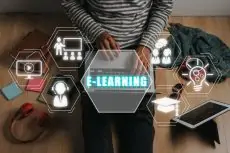
In today’s rapidly evolving learning landscape, e-learning apps are taking center stage. Here at Net-Craft.com, a leading force in Scottsdale App Development, we understand the growing demand for engaging and accessible learning experiences. This begs the question: what goes into mastering e-learning app development?
This blog post delves into the key features and budget considerations involved in crafting a successful e-learning app. Whether you’re a seasoned educator or a business seeking to onboard and train employees efficiently, this guide will equip you with the knowledge needed to navigate the e-learning app development journey.
Understanding User Needs: The Bedrock of Scottsdale App Development
As with any successful app, understanding your target audience’s needs is paramount. For e-learning apps, this means considering learner demographics, learning styles, and preferred content formats.
Here’s how top mobile app development in Scottsdale approaches user-centric design:
Identifying Learner Profiles: Is your target audience composed of visual learners who thrive on interactive elements, or auditory learners who benefit most from audio lectures? Tailoring content delivery to different learning styles is crucial for engagement.
Content Accessibility: Ensure your app caters to users with disabilities by incorporating features like closed captioning for videos, alternative text for images, and text-to-speech functionality.
Offline Accessibility: Allow users to download content and access it offline. This caters to those with limited internet access or who wish to learn on the go.
Essential Features for Your E-Learning App
Now, let’s explore the fundamental features that should be considered when working with a best app development agency in Scottsdale to create your e-learning app:
Content Management System (CMS): A user-friendly CMS allows you to easily upload and manage learning materials, including videos, images, and text documents.
Interactive Learning Elements: Gamification techniques, quizzes, and interactive activities can enhance engagement and make learning more enjoyable.
Progress Tracking and Assessments: Allow users to track their progress through courses and assess their learning with built-in quizzes and tests.
Personalized Learning Paths: Catering to individual learning styles can be achieved through personalized learning paths that recommend content based on user performance and preferences.
Push Notifications & Reminders: Remind users about upcoming lessons, deadlines, and new content through push notifications that encourage consistent engagement.
Social Learning Features: Foster a sense of community and interaction through discussion forums, collaborative tasks, and chat functionalities.
Budget Considerations for Your Scottsdale App Development Project
The cost of developing your e-learning app will depend on a variety of factors, including:
App Complexity: A simple, text-based app will require less development time and resources compared to one featuring rich multimedia content, animations, and interactive elements.
Platform Development: Will your app be native (developed specifically for iOS or Android) or cross-platform (developed to function on both platforms)? Native apps offer a more optimized user experience but may require separate development processes.
Development Team Expertise: The experience and skillset of your chosen Scottsdale App Development team will impact the overall cost.
Here’s a breakdown of some typical cost components:
Project planning and design: This includes user research, wireframing, and prototyping.
App development: The coding and programming needed to bring your app to life.
Integration of features: Adding features like push notifications or social learning will increase the complexity and cost.
Quality assurance and testing: Ensuring a bug-free and well-functioning app requires rigorous testing.
App store submission fees: There are fees associated with submitting your app to the Apple App Store and Google Play Store.
Net-Craft.com: Your Partner in E-Learning App Development Success
Net-Craft.com, a top mobile app development company in Scottsdale, understands the complexities of e-learning app development. We work closely with you to define your vision, understand your target audience, and create a budget that aligns with your goals.
Here’s how we can help you navigate through the process:
Experienced Team: Our team comprises seasoned developers skilled in crafting engaging and user-friendly e-learning apps.
Agile Development Methodology: We adopt a flexible Agile approach that allows for continuous feedback and adaptation throughout development.
Data-Driven Approach: By leveraging analytics, we’ll track user behavior and identify opportunities for improvement to optimize the learning experience.
E-Learning App Development: A Lucrative Investment
Developing an e-learning app represents a smart investment in the future of education and training. The benefits are numerous:
Increased Accessibility: E-learning apps provide a flexible and accessible learning format, allowing users to learn at their own pace and convenience.
Scalability and Cost-Effectiveness: E-learning apps can be easily scaled to accommodate a large number of learners, making them a cost-effective training solution for businesses and educational institutions.
Improved Learning Outcomes: Engaging and interactive e-learning experiences can lead to better knowledge retention and improved learning outcomes compared to traditional methods.
Enhanced Brand Image: For businesses, a well-designed e-learning app can showcase your commitment to employee development and innovation, strengthening your brand image.
Ready to Master E-Learning App Development with Net-Craft.com?
At Net-Craft.com, your trusted Scottsdale App Development partner, we’re passionate about helping you create a successful e-learning app that empowers learners and drives positive outcomes.
Contact us today for a free consultation and let’s discuss how we can transform your vision into a reality. Together, we can leverage the power of e-learning to make education and training more accessible, engaging, and effective.
Content Source https://www.net-craft.com/blog/2024/03/22/mastering-e-learning-app-development-features-and-budget-unveiled-brought-to-you-by-scottsdale-app-development-leaders-net-craft-com/
#E-Learning App Development#Scottsdale App Development#E-Learning App#Best App Development Agency in Scottsdale
2 notes
·
View notes
Text
Modern education is not a failure. This is such a fucking weird, awful opinion to even have for an educator?! Gains in literacy levels alone from before and after formal education existed disprove this. 100 years ago worldwide literacy levels were literally 12%. They’re now about 87%. That is pretty much entirely thanks to formal education. Before the public formal education system, if you were poor, and I cannot stress this enough — NO ONE WOULD BOTHER TO TEACH YOU TO READ.
People know substantially more than they used to before we formalized our education systems. But there are things schools can do and things they can’t, and this is actually really important.
Schools cannot make kids “smarter”. People have general aptitudes (the best they can do at their peak given all possible supports) and that’s mostly based on genetics. The best school and teacher in the world cannot make every kid an Einstein. The world can make people less smart, though. Lead poisoning, poverty, lack of food, lack of sleep — and schools can (and do) play a really big role in protecting kids from those harms, too, by providing safe places to be, free meals, time to socialize with their peers (as opposed to, say, living on their farm and only interacting with their family), and exposure to ideas and skills beyond what their parents knew. They also teach them how to read and write. If you are reading this right now? It’s very likely because the formal education system TAUGHT YOU HOW. Or taught your parents how.
What schools, in my opinion, should not be, is the place where students are inculcated into whatever social ideas are most prominent at the time, and that’s where OP is just very clearly going with their own opinion and not in anything based on research. Schools are meant to teach critical thinking, frameworks, methods, and the hard skills like reading comprehension and math that are how we develop and support more complex thoughts. How best to do that via pedagogy has been and will continue to be a conversation. Yes, you should try and choose books that kids find interesting so they’ll enjoy the process more. But can anyone - literally anyone - who has been out in the real world with a real job honestly say “well, you get to just do whatever you want with no consequences out here, so learning how to do work you aren’t interested in has no value”?
Life is hard, and we need people to do lots of boring, difficult jobs because that is literally the foundation everything you have is built on. Food, water, clothes, music — you would have very few of these things without people doing boring jobs they don’t always love or find interesting in a capitalist society. No other kind of society has ever actually succeeded outside of very small, transient examples. There are plenty of bad things about the capitalist system we currently have, but no one has ever proposed a better system in any kind of detail OR been able to prove it would work. The quality of life of a poor American only looks horrible to you because you are comparing it to the life of a rich American, and not comparing it to the actual relevant situation, which is a poor person before formalized education and modern capitalism existed. Those people, on the whole, simply died after difficult, often short, deeply labor intensive lives of backbreaking work.
Schools were never really meant to be morality factories. You only HAVE schools because of capitalism, and the point of them has always been so you can have a better chance at financially surviving in a world that has always been a challenge. They give you a fighting chance when before you would have had none. You should no more want your school “teaching” whatever kind of complex social frameworks are currently in vogue than you’d want them teaching your kids what religion to believe. That’s not what they’re for. Teaching you how to think is not the same as teaching you what to think.
I remember thinking this shit when I was in high school and college. “when am I ever going to use this?” “Why don’t people just do XYZ?” And guess what? I didn’t know WTF I was talking about because I hadn’t had nearly the opportunity to delve into the complex and frustrating realities of the real world, where very little is ever simple and everything is a complex system.
The thing is, what kids want, and what is best for them, are often different things. I had a friend who, when she was a child, had a mild lazy eye. Her doctor told her she had to wear a patch every day on the other eye to train the muscles in the lazy eye better. She hated the patch and didn’t like to wear it because it was uncomfortable. Well, guess what? Her mother didn’t make her wear it, and now her eye is still kind of fucked. Do you think she’s happy about that? Of course not. Because she was a child, and her mother wasn’t, and should have known better. The discomfort at the time would have been worth it to her now. A lot of school turned out to be like that for me.
The world is not a perfect place, but it makes me absolutely insane when people act like we aren’t incredibly, unbelievably better off than we used to be because of the systems we’ve built. No one is saying don’t try to continue to improve things, but these kinds of purely political takes are not based in evidence.
A Twitter Thread from David Bowles:
[Text transcript at the end of the screenshots]
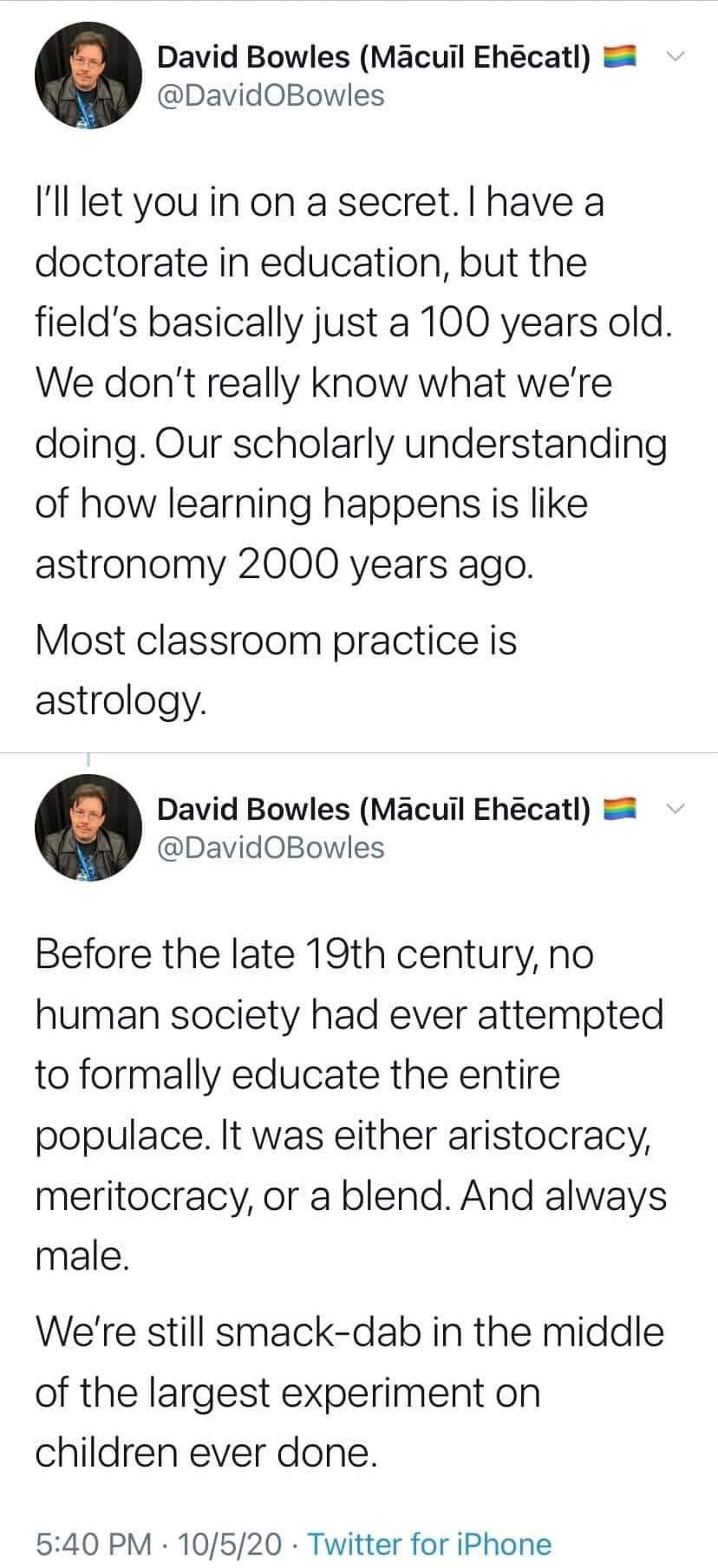
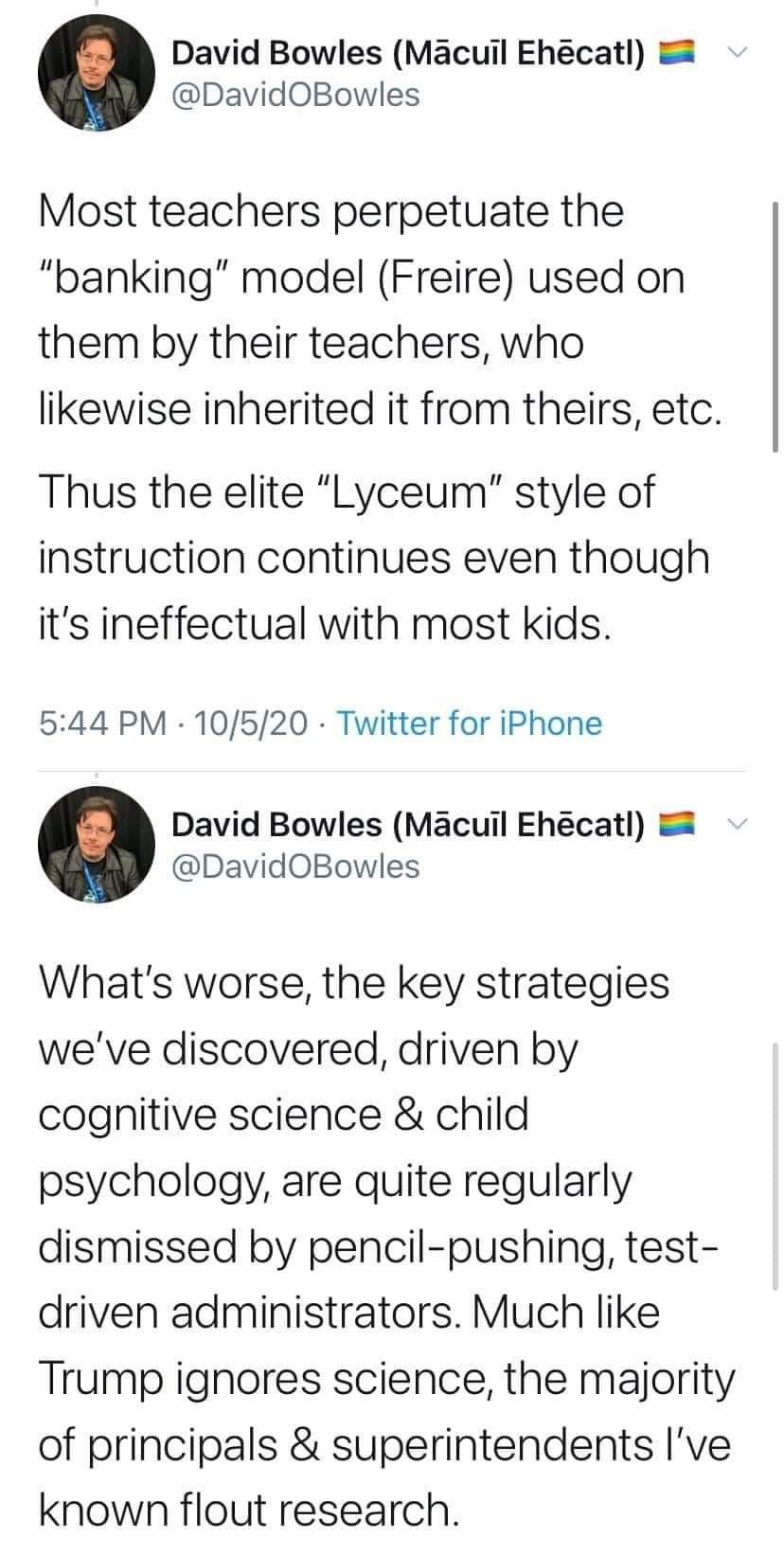
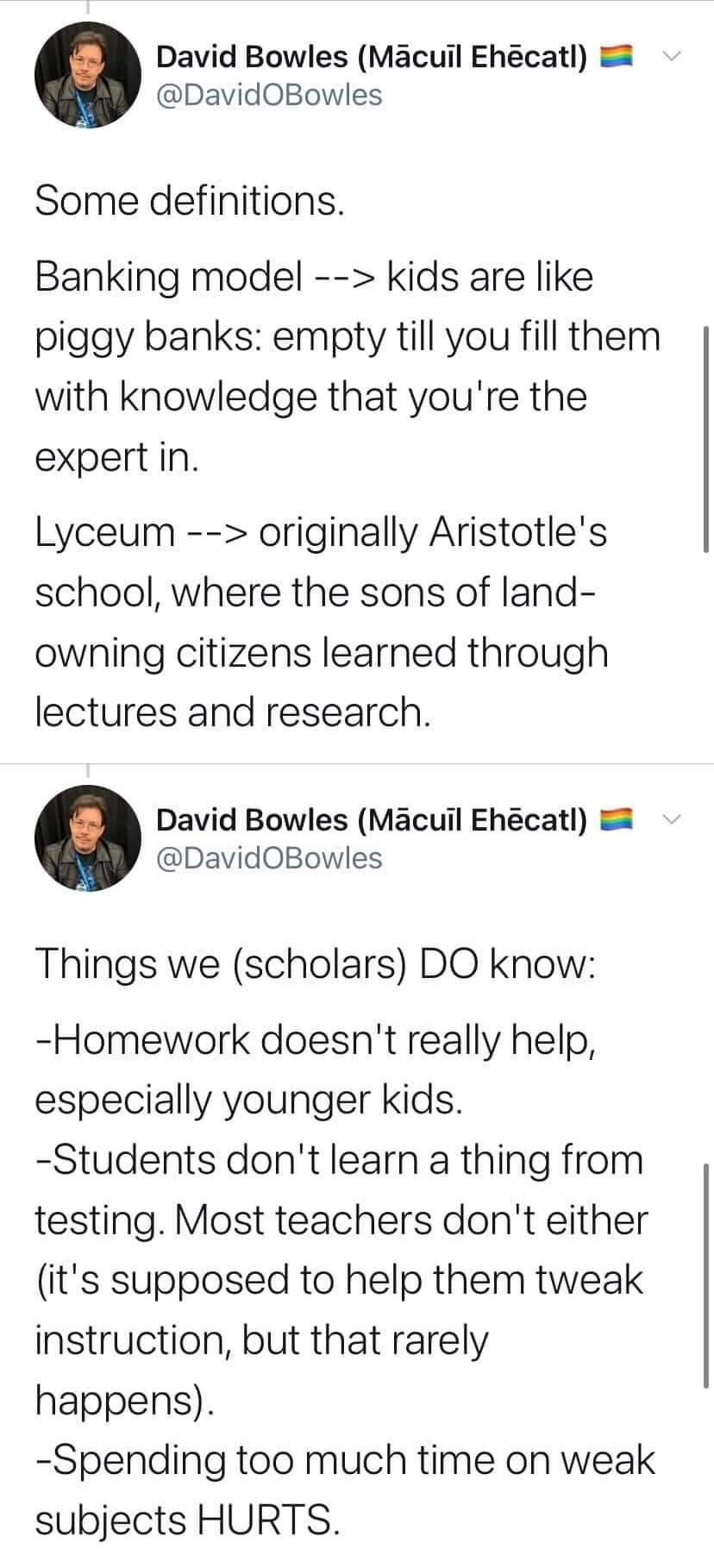
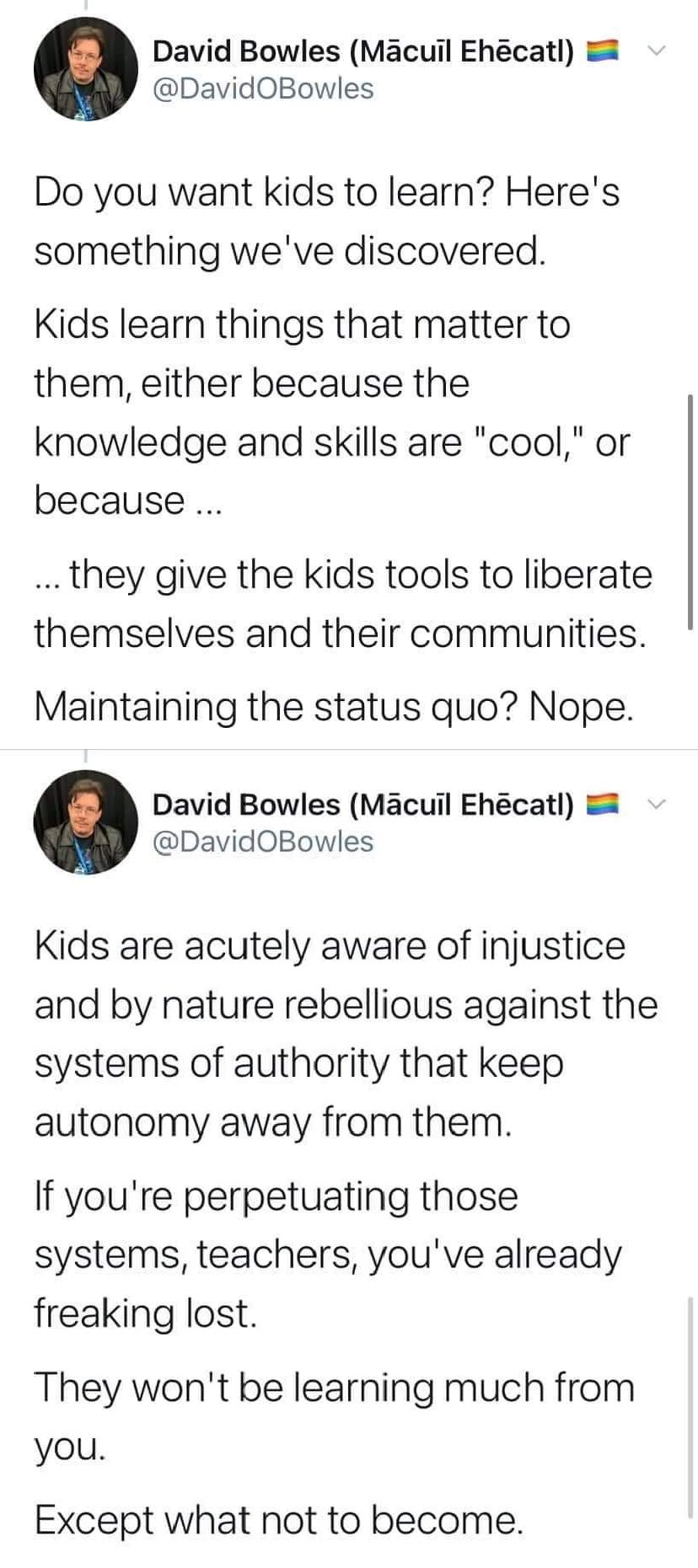
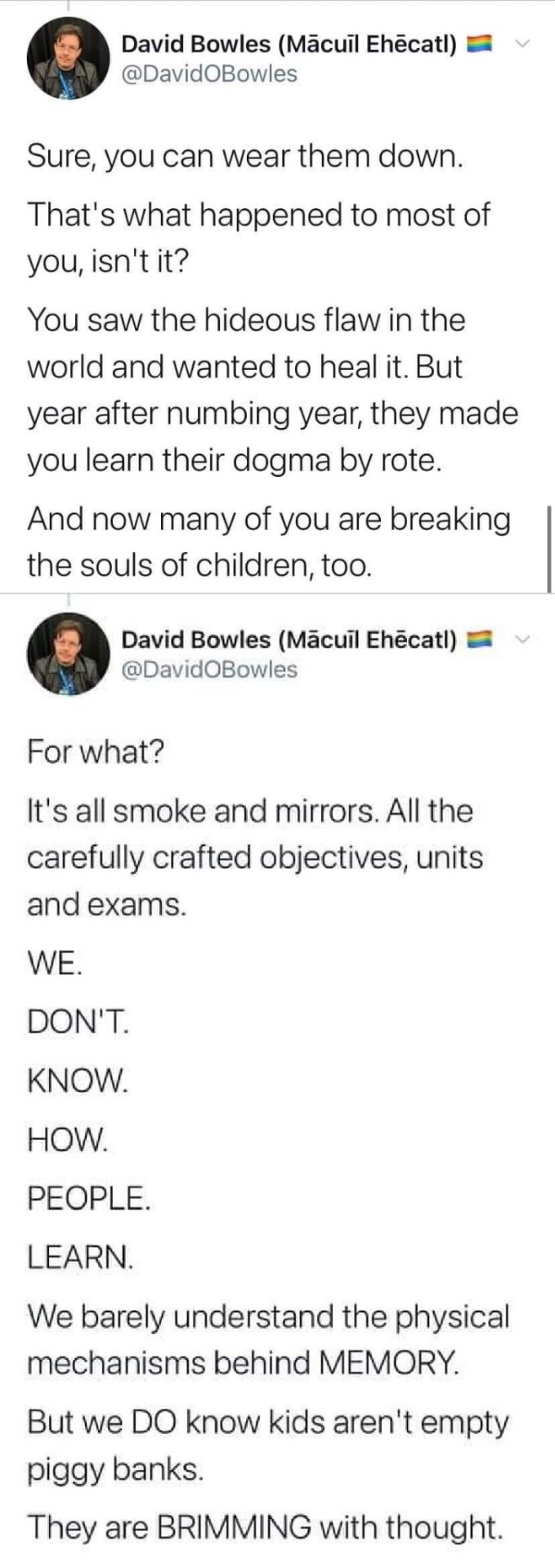
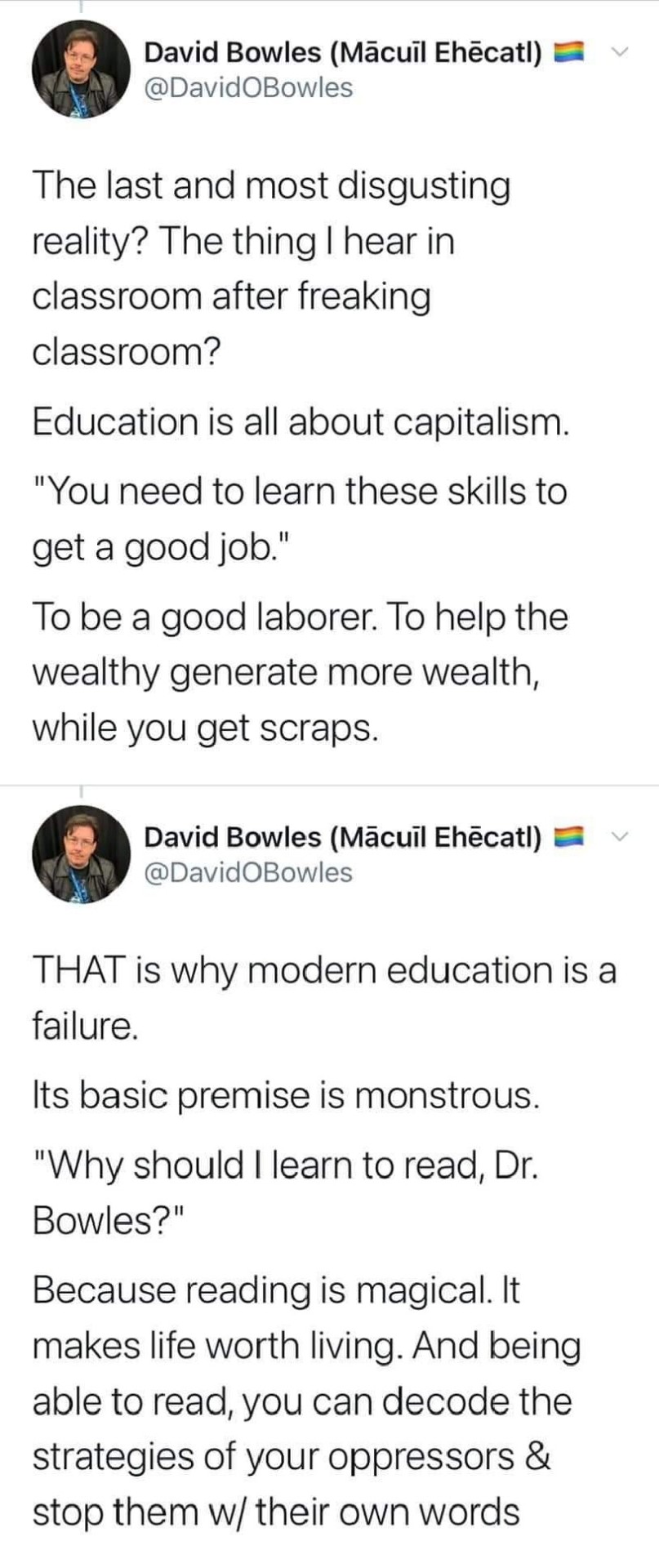
I'll let you in on a secret. I have a doctorate in education, but the field’s basically just a 100 years old. We don’t really know what we’re doing. Our scholarly understanding of how learning happens is like astronomy 2000 years ago.
Most classroom practice is astrology.
Before the late 19th century, no human society had ever attempted to formally educate the entire populace. It was either aristocracy, meritocracy, or a blend. And always male.
We’re still smack-dab in the middle of the largest experiment on children ever done.
Most teachers perpetuate the “banking” model (Freire) used on them by their teachers, who likewise inherited it from theirs, etc.
Thus the elite “Lyceum” style of instruction continues even though it’s ineffectual with most kids.
What’s worse, the key strategies we’ve discovered, driven by cognitive science & child psychology, are quite regularly dismissed by pencil-pushing, test-driven administrators. Much like Trump ignores science, the majority of principals & superintendents I’ve known flout research.
Some definitions:
Banking model --> kids are like piggy banks: empty till you fill them with knowledge that you're the expert in.
Lyceum --> originally Aristotle's school, where the sons of land-owning citizens learned through lectures and research.
Things we (scholars) DO know:
-Homework doesn't really help, especially younger kids.
-Students don't learn a thing from testing. Most teachers don't either (it's supposed to help them tweak instruction, but that rarely happens).
-Spending too much time on weak subjects HURTS.
Do you want kids to learn? Here's something we've discovered: kids learn things that matter to them, either because the knowledge and skills are "cool," or because .... they give the kids tools to liberate themselves and their communities.
Maintaining the status quo? Nope.
Kids are acutely aware of injustice and by nature rebellious against the systems of authority that keep autonomy away from them.
If you're perpetuating those systems, teachers, you've already freaking lost.
They won't be learning much from you. Except what not to become. Sure, you can wear them down. That's what happened to most of you, isn't it? You saw the hideous flaw in the world and wanted to heal it. But year after numbing year, they made you learn their dogma by rote.
And now many of you are breaking the souls of children, too.
For what?
It's all smoke and mirrors. All the carefully crafted objectives, units and exams.
WE. DON'T. KNOW. HOW. PEOPLE. LEARN.
We barely understand the physical mechanisms behind MEMORY. But we DO know kids aren't empty piggy banks. They are BRIMMING with thought.
The last and most disgusting reality? The thing I hear in classroom after freaking classroom?
Education is all about capitalism.
"You need to learn these skills to get a good job." To be a good laborer. To help the wealthy generate more wealth, while you get scraps.
THAT is why modern education is a failure.
Its basic premise is monstrous.
"Why should I learn to read, Dr. Bowles?"
Because reading is magical. It makes life worth living. And being able to read, you can decode the strategies of your oppressors & stop them w/ their own words.
#public education#capitalism#these kind of takes make me insane#PLEASE actually look up historical data if you want to make these kinds of statements
97K notes
·
View notes
Text
Above the City: Living the Elevated Life with House of Hiranandani
In a world where urbanization often comes at the cost of comfort and well-being, a few developers are redefining what it means to live in a city. One such name leading the change is House of Hiranandani, known for delivering premium townships that merge elegance, smart infrastructure, and sustainable living.

Rather than merely building apartments, House of Hiranandani envisions entire communities—spaces that support holistic lifestyles, combining modern architecture with environmental harmony and rich social experiences. This unique approach has earned them a distinct place in India’s real estate landscape.
Crafting Tomorrow’s Communities
The core idea behind House of Hiranandani projects is to go beyond traditional housing. Their developments are designed as integrated townships, offering everything from education and healthcare facilities to retail zones, fitness centers, and green spaces—all within walking distance. This self-contained model adds immense convenience and reduces dependency on external infrastructure.
Whether it's a high-rise in bustling cities like Mumbai and Bangalore or serene waterfront residences in Chennai, each project is built with an eye for both detail and the bigger picture. The focus is on lifestyle enhancement, not just property development.
Signature Developments Across India
With a presence in key urban centers—Mumbai, Bangalore, Chennai, and Hyderabad—the brand has created iconic landmarks that stand out for both aesthetics and function. These projects combine high-end architecture, lush landscapes, and modern amenities to offer an unparalleled living experience.
For instance, their residential spaces in Bangalore are known for large, open layouts, advanced security systems, and abundant green cover—ideal for both working professionals and families. In Chennai, the township in Egattur features breathtaking views, waterfront walkways, and world-class recreational zones.
Each project is a blend of nature and modernity—designed to offer peace without compromising on connectivity.
Designed to Inspire
What makes House of Hiranandani stand apart is its unique design philosophy. The buildings often feature a mix of neoclassical and modern architectural elements. Tall French windows, expansive balconies, and artistically landscaped gardens are standard, creating homes that are both beautiful and functional.
The brand is also known for pioneering vertical townships—soaring towers that offer panoramic views of city skylines or natural surroundings. These vertical spaces enable smart land use, allowing for more open areas and shared amenities at the ground level.
Homes come equipped with future-ready features—smart security, energy-efficient fittings, and thoughtfully planned interiors—all aimed at offering more comfort per square foot.
Building Green, Living Better
Environmental consciousness is woven into the brand’s DNA. House of Hiranandani integrates green technologies and practices such as rainwater harvesting, solar energy systems, organic waste converters, and energy-efficient lighting in its projects.
Green spaces aren’t just ornamental—they’re functional. Lush parks, tree-lined pathways, and serene water bodies offer both visual appeal and health benefits. This focus on sustainability not only benefits residents but also ensures better long-term value for homeowners and investors alike.
More Than a Home: A Thriving Community
What truly completes the living experience at any House of Hiranandani township is the sense of community. Common areas like clubhouses, sports zones, and cultural spaces are designed to encourage interaction and connection among residents.
Families can enjoy weekend activities, children have dedicated play areas, and elders find serene corners to relax—all without leaving the premises. Regular events and celebrations also help in building strong bonds among neighbors, fostering a vibrant and inclusive environment.
The Future of Urban Living
As cities expand and life becomes faster, the need for thoughtfully planned, high-quality residential communities will continue to grow. House of Hiranandani is leading this shift by not only responding to urban challenges but anticipating future needs—be it sustainability, technology integration, or community-centric design.
They have successfully positioned themselves as more than just builders—they are creators of lifestyles that resonate with the aspirations of modern India. For anyone looking to invest in a space that brings together luxury, utility, and peace of mind, this brand offers a future-proof choice.
0 notes
Text
0 notes
Text
0 notes
Text
0 notes